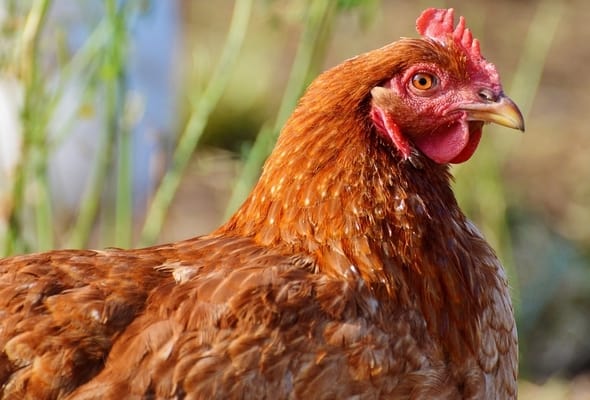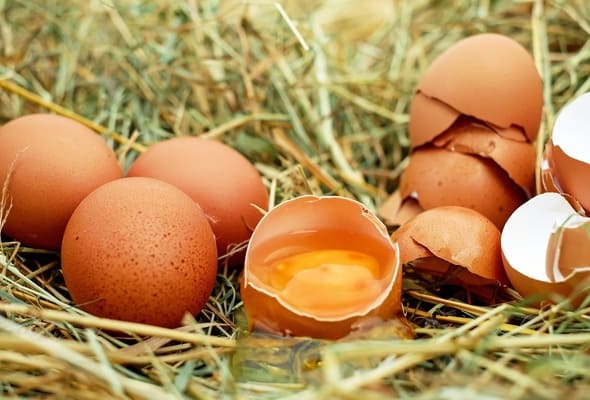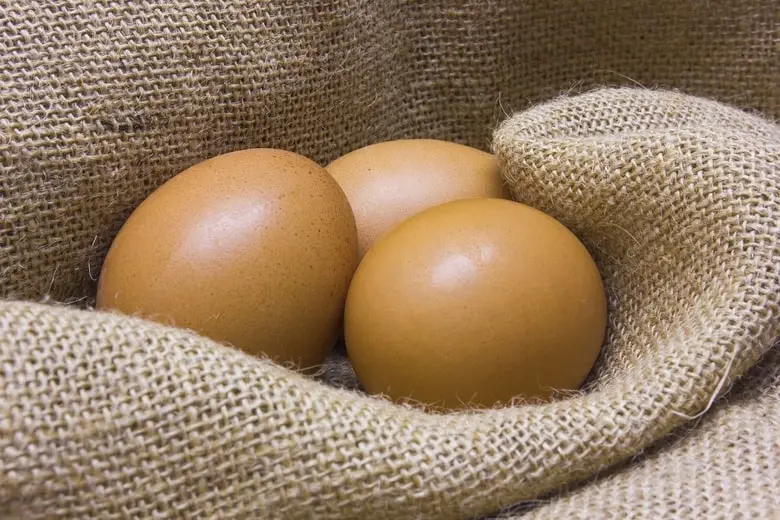If you’ve ever sat down to a meal to devour some sunny-side up eggs, you’ve maybe been a bit concerned you were eating a baby chicken. Are you really, though? Let’s think about that! How do chickens develop eggs? What do hens do if their eggs are not fertilized? Can chickens lay eggs without mating?
Can Chickens Lay Eggs Without Mating?
Female chickens, or hens, become sexually mature at about six months old and can begin laying eggs with or without a male chicken, or rooster. This is because without a rooster, the eggs are simply unfertilized, leaving behind an egg safe for eating.
Laying eggs is a normal bodily function for hens due to the ovulation process, so a rooster is only needed to help increase flock numbers.
Roosters are oftentimes not allowed in backyard flocks because of their loud crowing or can even be aggressive, so we might even be a bit more thankful that chickens are able to lay eggs without a rooster present!
Hens go through the full ovulation process every 24 to 26 hours, meaning most should lay one egg a day, or every other day, throughout their years. Most hens lay until they are about 3 or 4 years old, and have a total life span of about 5 or 6 years.
If a hen isn’t laying eggs every day or two, she could have a genetic disorder, be infertile, or have something wrong with her physically, like a blockage, that is stopping her from laying an egg.
Unfertilized eggs are not baby chickens, but even if they have been fertilized, it takes a long time for them to be considered chicks. If a rooster is present, and an egg is then fertilized, and left to incubate, it will become a fully developed chick and hatch after 21 days.
There really isn’t a nutritional or characteristic difference between fertilized and unfertilized eggs; it just means that one is safe for human consumption, and one will result in a baby chicken.
Why Do Chickens Lay Eggs Without Mating?
The easiest answer to this question is instinct. Hens are natural mothers and their first thought is to gather a clutch of eggs to raise to hatch.

They don’t know that they have or have not been fertilized by a rooster. Hens will sit on their nests to keep their eggs warm until they hatch, unless the eggs are collected instead. When hens do this, it is called being broody.
Another reason for this is normal bodily functions. Ovulation is a natural occurrence in hens, as mentioned before, and happens at least every 24 hours. Therefore, they will lay every day whether they have been with a rooster or not.
Eventually, hens do stop laying when they get older, just like many other female species. Their biological clock stops, and so do the eggs.
What Do Chickens Do With Unfertilized Eggs?
Interestingly, some hens are infertile, just like humans. So even with a rooster, they may not be able to lay fertilized eggs.

This is usually a genetic disorder, though. For the most part though, hens are able to raise a clutch of eggs just fine if they are left to incubate.
As mentioned above, chickens can become broody when they have a clutch of eggs. This means they stay in the nest with the intent to hatch their eggs, even though there was no rooster.
Some hens can create quite the collection! They could possibly store up to 20 eggs without being noticed in a short amount of time. Some hens will even start gathering or sitting on other hens’ eggs as well.
However, some hens are not as motherly and can lay eggs everywhere but the nest. This could be somewhere as obvious as the ground or under the straw on the floor instead of their nest box.
Maybe they are more aware that the eggs are not fertilized and this is why they don’t care where they lay. Others argue that this is due to breeding out hens’ natural mothering instinct. Whatever the case is, they just abandon the eggs to be collected or taken elsewhere.
In even rarer circumstances, some hens may even eat or destroy their own eggs. This is usually because of boredom, poor diet or a crowded or stressful environment, however, and not a typical circumstance.
Hens are omnivores, which means they eat a little bit of everything so it really doesn’t hurt them to do this, but if hens are choosing to eat eggs, it usually means something unpleasant and should be checked out. The biggest instinct for hens is to protect their eggs; so to do the opposite could suggest severely poor health.
Do Unfertilized Eggs Hatch?
What happens then if there is no rooster to fertilize the egg? Do they hatch? No, they will not hatch. There will just be an egg laid by a hen, ready for collection, or if left for too long, it will rot.
Eggs actually can last quite a while without going bad; in most countries eggs are not even refrigerated. But after one week, an egg starts to decline in quality. After a couple of weeks, well, you’ve probably got a really nasty smelling mess on your hands.
Eggs must be fertilized in order to become a chick. In addition to that, eggs have to be properly incubated for 21 days until they are fully developed to hatch. This means the eggs must be kept totally warm and still under a mother hen, or in a mechanic incubator. Without these conditions, it is just an egg ready to be a tasty meal!
Conclusion
Laying eggs is naturally a day to day occurrence for hens. This is due to ovulation, and whether or not there is a rooster to fertilize the hens, it will happen regularly until a hen is too old to lay.
Unfertilized eggs can be forgotten, unnoticed, or thrown away if there are too many of them; but usually, eggs are sold for human consumption and are eaten around the world every day.

